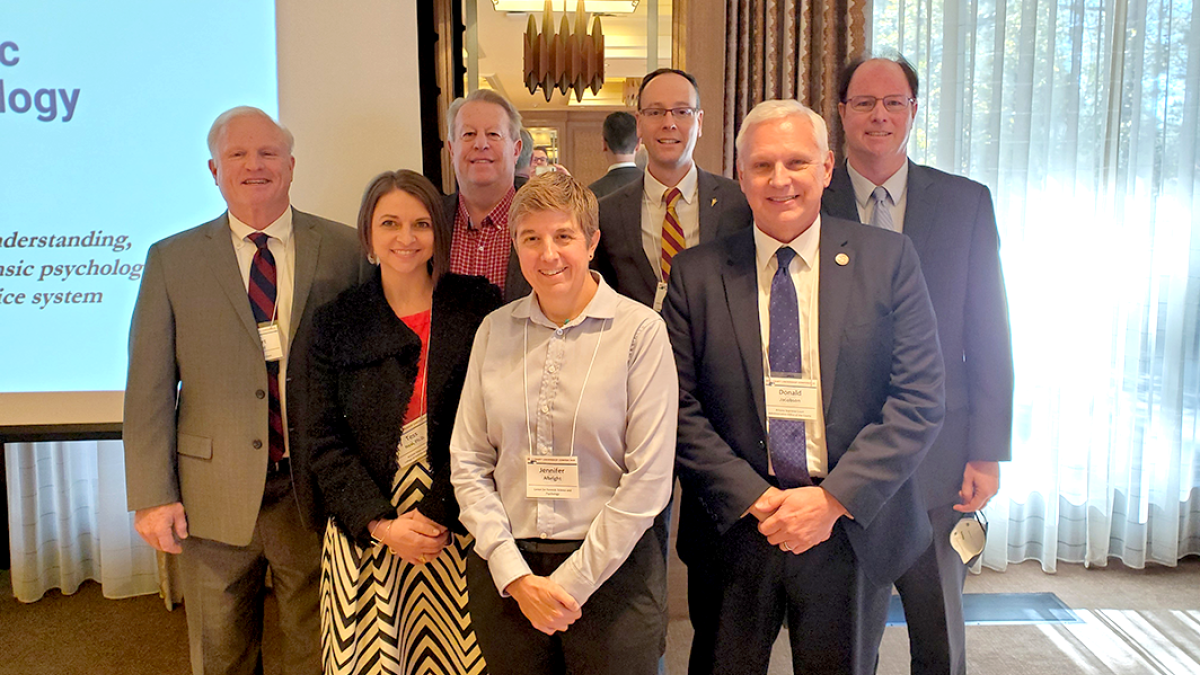ASU partners with Arizona Supreme Court to launch Center for Forensic Science and Psychology

On Oct. 26, Arizona Supreme Court officials and ASU New College came together in Flagstaff, Arizona, to announce the Arizona Supreme Court Center for Forensic Science and Psychology. (Back row, from left) Chief Justice Robert Brutinel, Arizona Administrative Office of the Courts Director Dave Byers, Dean Todd Sandrin and Director Scott Barclay. (Front row, from left) ASU Associate Professor and Future of Forensic Science Initiative Director Tess Neal, Arizona Supreme Court Center Director Jennifer Albright and Arizona Supreme Court Special Project Consultant Don Jacobson.
Editor’s note: This story is featured in the 2022 year in review.
The Arizona Supreme Court has announced a new partnership with Arizona State University’s New College of Interdisciplinary Arts and Sciences with the official launch of the Arizona Supreme Court Center for Forensic Science and Psychology.
The new center will be a focal point in the Arizona Judicial Branch to foster the application and integration of forensic science and forensic psychology within the justice system.
“ASU New College is proud to partner with the Arizona Supreme Court as it launches the Center for Forensic Science and Psychology,” said Todd Sandrin, dean of New College and vice provost of ASU's West campus. “This new initiative has the potential to have profound and positive effects on the justice system in Arizona by putting forensic science and forensic psychology at the forefront.
“Our faculty and students are innovators in forensics, and through this partnership, they will have the opportunity to lend their expertise and services to all Arizona courts. I commend all of the faculty, staff and collaborators whose hard work and dedication to excellence made this possible.”
The mission of the center is to examine and disseminate the most up-to-date understanding, training and application of forensic science and forensic psychology as applied to various case types throughout the justice system.
In recent years, New College has seen tremendous growth and interest in forensics. The college is home to the Future of Forensic Science Initiative, a transdisciplinary hub of basic scientists, applied scientists and practitioners pioneering a world-class intellectual space for forensic science. ASU forensics students and researchers at New College also work within the Global Human Rights Hub, which strives to transform cutting-edge human rights research into policy-relevant recommendations that advance the cause of social justice.
In addition, New College offers several degrees in forensics that take an interdisciplinary and practical approach, including bachelor’s degrees in forensic science, forensic psychology and computational forensics as well as master’s degrees in forensic science and forensic psychology and a doctoral program in law and psychology.
Since 2014, New College has granted more than 1,800 degrees in forensic science, forensic psychology, computational forensics, and law and psychology.
"Like ASU, the Arizona courts have a record of creativity and thought leadership. This new partnership builds on our legacies of innovation through the creation of a globally distinct collaborative center,” said Tess Neal, an associate professor in the School of Social and Behavioral Sciences and founding director of the Future of Forensic Science Initiative.
“This bridge between a major research university and one of the biggest legal jurisdictions in the country has high promise for improving the quality of expert evidence in courts. In addition, bringing multiple types of expert evidence together under one roof signals an innovation in thinking, such that the courts are ready to explicitly deal with issues that are similar across all types of expert evidence. This advancement in thinking has the potential to improve how courts deal with scientific and expert evidence in general — in Arizona and beyond."
In the first year of the partnership, those involved intend to build mutually beneficial research and service relationships, develop translational educational opportunities to build bridges between ASU scholars and legal practitioners, and host several conferences.
Don Jacobson and Dave Byers with the Administrative Office of the Courts have led the development of the center, while Jennifer Albright has been named the center’s first director.
“The Arizona Supreme Court is honored to expand on its existing collaboration with Arizona State University in the area of forensics and mental health in the justice system through ASU’s Future of Forensic Science Initiative,” said Albright. “Both ASU and the Arizona judiciary are well recognized as leaders in innovation, and a partnership between the Arizona Supreme Court’s Center for Forensic Science and Psychology and ASU’s Future of Forensic Science Initiative will have positive impacts across the state.”
Albright added that the partnership will also create new opportunities and resources for ASU faculty and students, including research, internships and pathways into careers in forensic science and psychology.
More Law, journalism and politics
Can elections results be counted quickly yet reliably?
Election results that are released as quickly as the public demands but are reliable enough to earn wide acceptance may not…
Spring break trip to Hawaiʻi provides insight into Indigenous law
A group of Arizona State University law students spent a week in Hawaiʻi for spring break. And while they did take in some of the…

LA journalists and officials gather to connect and salute fire coverage
Recognition of Los Angeles-area media coverage of the region’s January wildfires was the primary message as hundreds gathered at…

